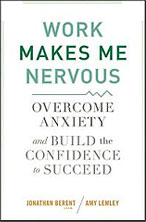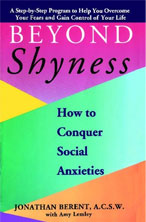Kevin
– PERFORMANCE ANXIETY AND HYPER-HIDROSIS RESOLVED WITHOUT MEDICATION
Q: Could you describe what your condition was that resulted in you coming for help?
KEVIN: Well the, um, physical symptom of my condition was, um, sweating, was, um, a what I now know as hyper-hidrosis. Um, and, um, as a
reflection of anxiety I would feel in either social or, um, business
situations. Um, and I would have episodes that would be unpredictable, meaning I could be in a, in a situation where I-I-I might expect to feel anxious or stress and have no symptom. Uh, or I could be in a situation where I might think or I might predict that I would be comfortable. And, uh, where I would have, uh, symptoms of anxiety that would be, um, manifested in sweating.
Q: Could you explain what would happen to you in a stressful situation?
KEVIN: Uh, it’s, some pro-, you know either some unexpect, uh, unexpected, um, either turn of attention towards me, um, or criticism of me or direct challenge to me. Um, would either catch me off guard or catch
me in a way that I wouldn’t expect it and my body temperature would rise. I would feel sort of a fight or flight, uh, reaction. And I’d start to perspire, um.
Q: How much perspiration and where?
KEVIN: It wo-, you know, it would begin slowly. Um, in the,
in the head and hair and the arms, uh, in the back. Uh, and eventually you know all over. Uh, you know I’m a person who tends to have a
high, you know, uh, body temperature in any event and gets revved up in any event. So it sort of just you know ignite the trigger.
Q: How was the condition impacting your life?
KEVIN: Well, um, it
was more impacting my happiness, um, than necessarily stopping me from doing things. Um, you know I did choose a career that was, you know, public in sphere and that was naturally confrontational, uh, in spite of having you know a base line level of social anxiety and this, you know, symptom. So you know, uh, it was, it was just making me not feel as comfortable and successful as I wanted to be. It was impacting my happiness and how I felt about myself. Um, uh, maybe the vigor with which I you know chose to pursue, you know, business and social situations.
Q: What would happen at work during an episode?
KEVIN: Uh, it would
more, I would, I would be embarrassed and I would, um, lose effectiveness
because I would lose focus. And my focus
would then be on not being embarrassed and not, and, and, and having this stop and not pursuing whatever it was I was doing.
Q: Did you ever have to leave a place to compose yourself?
KEVIN: Absolutely, yeah I would take bathroom breaks and, uh, try to catch my breath and recompose myself and seek opportunities to gain, regain control of my physical, uh, person, absolutely.
Q: Were you obsessively worrying about when it was going to happen?
KEVIN: Uh, I
would. I, you know, um, you know there’s
two, there’s two sides to that coin. I think you never know what’s going to happen so you always kinda worry it could happen and if you start to feel symptoms of it you’d, you know then that’s all you can think about. Um, and, but you know that I’m doing you know much better with and I have a better self awareness and understanding of it. I
think it’s almost important to know and recognize and embrace that it, it could happen. Uh, because it’s not that big a surprise to you and it’s something that you accept and.
Q: Back then you were
obsessively worrying and creating the symptoms.
KEVIN: Yeah, but I
think you also, you also, you tend to pretend and avoid you know your condition and avoid thinking about that you, that you suffer from this condition. That you have these symptoms and, and you’d
rather pretend that you’re not, that your a very confident person who doesn’t have this level of anxiety and so you don’t deal with it.
Q: On a scale of one to ten starting at one, where are you at in meeting your therapeutic goals/expectations?
KEVIN: Uh, I would
say an eight plus.
Q: Describe how you
got to an eight, what you did to get there.
KEVIN: Um, it, it’s
gonna sound kinda like you know duh you know, oh it’s so easy and I mean that sarcastically. It’s a, for me it’s been
a matter of, um, accepting it. You know and understanding that I have a physical symptom that comes with adrenaline and th-that also is paired with anxiety and it can go good and it can go bad. But you have to, I have to know that that is some, a way that I react and to work with it.
Q: Talk about the acceptance dynamic.
KEVIN: You know part
of, part of what would make me anxious and sweat is, is, is when it would
start. I’d start to worry about what would people, what are people gonna think about me if they can see me sweating and seeing me be nervous or anxious? Then it sort of feeds upon itself. Um, when you start, when I start to let go of well I don’t really care if people see me sweat or I’m gonna have to live with the fact that people might see me sweat then you’re, I become much more in control of the level and frequency of whether I do sweat at all.
Um.
Q: What were you able
to do to abort the cycle of sweating?
KEVIN: Well you know
I was in the middle of something and I was present, presenting and there was no
opportunity for me, me to really leave or try to gain control or, or, or, you
know flee I guess. So it’s not fight but
to forward-looking-flight, engage in flight.
Uh, and you know rather than sort of sit there and crash and burn and,
and be a sweaty, ineffective mess I decided I’m really gonna care more about
doing a good job of what I’m doing right now, which I know I’m very good
at. And, and if I sweat you know well
everyone’s gonna you know have to understand that and live with it because you
know that’s who I am. And the sweat
slowly started to subside and I did a really good job. And you know some people saw me sweat a
little bit but you know I think at the end of the day what they thought
somebody did an awesome presentation.
Q: Describe your
quality of life at an eight now.
KEVIN: Well I spend a
lot more time thinking about, uh, being in a good mood. And feeling good about myself, and trying to
be me. And again that sounds sorta you
know overly simplistic but, um, I spent a lot of time for the long time trying
I think to be somebody else and sort of pretend that I was this, uh, super
confident, um, other person. Rather than
being great at being me. I was trying to
be you know somebody else. And you know
now that I accept some of my flaws and, and, um, I can be a lot better at the
things that I am good at. Um, so I think
the vibrancy of my personality even at this you know medium stage of my life is
starting to come out and, in full bloom and I think I’m funnier, more
interesting person. The funny interesting
you know entertaining vibrant person I always knew I was but that I was mad
that people weren’t, uh, embracing. I
think I’m, I’m becoming more and more each day.
Q: So you put your
internal critical script in perspective?
KEVIN: Yeah, and you
know it’s still there and it’s, you know I liken it to being you know somebody
you know like, you know, an alcoholic or somebody who ha-, who has habits you
know that they need to deal with. It’s,
there’s a tendency to be overly critical for my, for me to be overly
critical. And I have to catch myself
when I start to do it and it gets easier and easier. At the beginning it seemed not hopeless, um,
because I, you know I had great hope for myself but a very daunting task. And now I, I’m, I just have, I know when I’m starting
to do it and I catch myself and I start just doing things in a much more
positive fashion. It’s just life is, is
I don’t know becoming a little easier.
Q: Any other advice
to give to someone suffering from the same thing?
KEVIN: You can work
on it. It can, you can do a lot better
and you can be a lot happier. Um, you
just gotta take a little bit of a leap of faith in yourself and leap of faith
that people, um, will really cut you a lot of slack, um, if you try to share
yourself with them and don’t, don’t run away.
Q: Excellent. Excellent.
Kevin, listen, thank you so much…For sharing.
KEVIN: You’re very
welcome.


